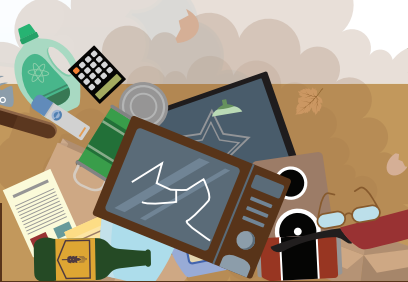Fly tipping blights our communities, posing a problem to our health, society, and the environment. But what is it, why does it happen and what can you do to help!
What is Fly-Tipping?
Fly-tipping is the illegal act of dumping items next to a road, in a lane, at industrial estates, in fields, in rivers, or private land without permission. This could include furniture, building materials, garden waste, general household waste or even hazardous materials. Disposing of waste in this way is illegal and in Cardiff Fixed penalties up to £400 can be issued for small scale fly tipping and for larger deposits there is a maximum possible fine of £50,000 or even a prison sentence.
There are not only financial costs associated with fly tipping but also environmental and social ones. A few of the issues it causes are being a target for arsonists, some plastics ending up in the eco system and it has a negative impact on tourism. Meaning that time and money that could be spent on other projects to improve our environment and communities is being used to clear up after others.
According to Stats Wales in 2019/20, the total number of fly tipping incidents recorded by Cardiff Council was 5,378 costing £309,241 to clear and dispose of. In 2020/21 this rose to 6896 fly tipping incidents recorded.
Why Does It Happen?
So why does fly-tipping occur? There are multiple social and economic reasons that people would fly-tip waste, influenced by all the factors in people’s lives. Some of these reasons are:
- The accidental use of illegal waste disposers. They may seem like the cheapest option but instead of disposing of the waste safely and legally, they may just fly tip it. If this waste is traced back to you, you could be fined for breaching your legal duty to safely dispose of your waste and issued a £300 FPN as an alternative to prosecution.
- Communities may not be aware of the waste disposal options available or believe they are unable to access them. Some people also do not understand they have a duty of care to dispose of their own waste safely and do not realise that leaving their waste on the street or a lane for others to take can cause issues.
- Unfortunately, there will always be some people who either do not wish to pay any necessary costs for disposing of waste or do not believe that they should have to clean up their own waste themselves. There has recently been a large increase in bagged domestic where people are dumping their black bags.
What Can you Do to Help?
- Make use of all your local council’s recycling and waste options which can be found on the Council website and the Cardiff Gov App. In Cardiff this includes:
- If you are still unsure of how is best to dispose of an item you can use this handy A-Z of recycling.
- It is important that if you are paying someone to dispose of your waste that you should ensure they are a registered waste carrier. For information on how to do this check Fly Tipping Action Wales’s website. Also take a note of the company name or person (Facebook post / advertisement on vehicle / leaflet provided), vehicle used and registration of vehicle and ask for a waste transfer note detailing the waste transferred and the cost paid.
- If you know a family member or friend who has waste to dispose of and they are not sure how, let them know about all these options.
- If you see fly-tipping, report it to us online or using the Cardiff Gov app. It is essential that you report vehicle used and registration, and description of vehicle, persons, including the DATE, TIME and LOCATION.CCTV recording can be accepted, however without the registration of vehicle the vehicle and owner cannot be traced to conduct investigations.
- But never approach fly-tippers as this could put yourself at risk. They are doing something illegal and will not want to be caught.
Published: 18/10/2021



Comments are closed.